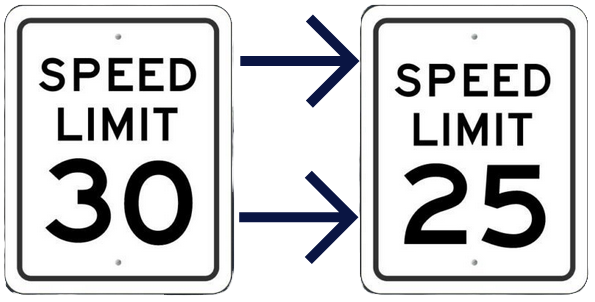We’re thrilled that the proposed ordinance to lower Chicago’s default speed limit has passed out of the Chicago City Council’s Committee on Pedestrian and Traffic Safety and soon will go in front of a full city council for a vote.
Before the vote, we presented a statement (see below) to the committee on behalf of a coalition of 13 Chicago-based organizations.
The statement said the measures included in the legislation will save lives and enhance mobility by lowering speed limits, reforming traffic fines and fees, and providing residents with new tools to address road hazards.
The letter highlights the urgent need for action, citing CDOT statistics that reveal 136 traffic fatalities in 2023, with speeding and reckless driving involved in a majority of these incidents.
Emphasizing the disproportionate impact on Black communities and older adults, the letter presents evidence supporting the effectiveness of lower speed limits in reducing fatalities. It also highlights similar legislative efforts that have been successful in other US cities.
Thank you to all who have taken action to make Chicago’s streets safer for all.
Dear Chairman La Spata and members of the committee,
On behalf of a coalition of organizations across the City of Chicago, we support the passing of ordinances O2024-0010990 and O2024-0010993 as well as resolution R2024-0010992 that will be considered at the Committee on Pedestrian & Traffic Safety on Monday, October 21st, 2024.
By lowering the speed limit, reforming our traffic fines and fees, and giving residents new tools to address hazards in the roadway, these pieces of legislation will save lives and improve mobility. They will also provide Chicago the opportunity to lead the country in creating a more equitable approach towards traffic safety while maintaining accountability for reckless behavior behind the wheel.
Traffic safety is a public health and safety crisis in Chicago and speeding and reckless driving by motorists are at the heart of the problem. According to the Chicago Department of Transportation (CDOT), 136 people were killed in traffic crashes in 2023. Speeding and reckless driving were involved in 68% and and 84% of those fatal crashes, respectively.
Like so many problems facing our city, this issue reflects deeper inequities. A disproportionate burden of traffic fatalities is carried by Black communities on Chicago’s South and West Sides. According to CDOT, two-thirds of people killed in traffic crashes in Chicago are Black. Our older adults are also among the most vulnerable, experiencing the highest pedestrian fatalities rate of any age group in the city.
The Chicago City Council has the opportunity to take action and pass legislation that will immediately address this public health and safety issue.
This is not rocket science, the physics are simple: The faster a driver travels, the slower their reaction time and the greater the impact upon collision. In collisions at 32 mph, about 25% of pedestrians will not survive, according to ProPublica research. For older pedestrians and people with disabilities, the odds are significantly worse. When someone is struck by a car moving at 23 mph, the person has a 90% chance of surviving.
Fortunately, we have a proven solution at our fingertips. Many other places — such as Boston, Seattle, Portland and New York City — have reduced urban-area speed limits, and the results have been tangible and life-saving, demonstrating that lowering speed limits is an effective, low-cost step that can be implemented swiftly to make our streets safer.
Lowering the speed limit is particularly effective at addressing the most reckless high-end speeding. The Insurance Institute for Highway Safety found that when Boston lowered the citywide speed limit from 30 mph to 25 mph, deadly speeding over 35 mph was reduced by almost 30%.
By setting a new expectation that drivers operate their vehicles at safe speeds, we also unlock other powerful tools in our traffic safety toolbox. Measures like speed humps, curb extensions and protected bike lanes can work in tandem with lower speed limits to create a holistic approach to traffic safety. We must invest in these critical infrastructure improvements so drivers intuitively travel at safe speeds.
We urge you and your colleague to support the passing of ordinances O2024-0010990 and O2024-0010993 as well as resolution R2024-0010992 that will be considered at the Committee on Pedestrian & Traffic Safety on Monday, October 21st, 2024.
Sincerely,
Active Transportation Alliance
Better Streets Chicago
Center for Neighborhood Technology (CNT)
Chicago Bike Grid Now
Chicago Family Biking
Commuters Take Action
Illinois Environmental Council
Metropolitan Planning Council
North Lawndale Community Coordinating Council
PeopleForBikes
Respiratory Health Association
Ride Illinois
Sierra Club Chicago

